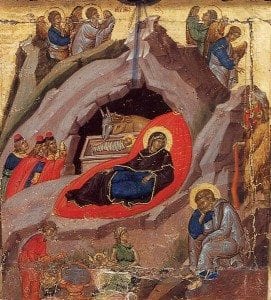St John Chrysostom: And the Word was made Flesh, and dwelt among us (John 1:14)

In commencing Homily 11 on the Gospel of St John the laity are first exhorted by St John Chrysostom to study the Scriptures. Then he turns his attention to explain the phrase: “And the Word became flesh and dwelt among us.”
He explains that the Word becoming flesh is an “ineffable honour” – transforming humanity. The condescension of Christ, the Master, in taking on the form of his servants allowed humanity to be elevated from “disgrace and darkness, to glory unspeakable”, without diminishing the glory of God.
The word “became” was considered important by the Saint as it anticipated the attacks of those who would deny the true Incarnation of Christ. It was not “an appearance, an act, an allegory”, but “His assuming of real flesh.” Again, St John emphasises that this did not change the Divine substance, only where it dwelt.
Dwelling in flesh, God the Word and flesh became one and raised up “the tabernacle of David that had fallen” (Amos 9:11). Humanity needed this, as it could not be raised up in any other way but through Christ, the God-man. Taking on human nature was not a temporary dwelling, but is “always with Him.”
In concluding, St John reminds us that it is our time to repay Christ for his mercy by avoiding worthless occupations which distract and divert us, and by looking after our souls. This is beneficial to us, for it is “utter madness and worthy of untold punishments” not to do so.
Source: Lychnos December 2020 – January 2021
